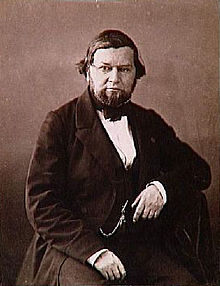Eugène-Melchior Péligot
Eugène-Melchior Péligot (born February 24, 1811 in Paris , † April 15, 1890 in Paris) was a French chemist who isolated pure uranium for the first time in 1841 .
Péligot proved that the black powder isolated by Martin Heinrich Klaproth in 1789 and believed to be uranium was actually uranium (IV) oxide (UO 2 ). The representation of the element uranium succeeded by reduction of uranium (IV) chloride (UCl 4 ) by means of potassium .
Péligot was Professor of Analytical Chemistry at the Institut National Agronomique , which after two merger steps is now part of the Institut des sciences et industries du vivant et de l'environnement (AgroParisTech) . Together with Jean-Baptiste Dumas , he introduced the name alcool méthylique ( methanol ) when they discovered the methyl radical in experiments with this substance . They were the first to produce ethers ( diethyl ether ) and various esters . In 1838 they succeeded in converting camphor into p-cymenewith the help of phosphorus pentoxide .
On March 15, 1852 he became a member of the Académie des Sciences .
Individual evidence
- ↑ US EPA uranium
- ↑ List of members since 1666: Letter P. Académie des sciences, accessed on February 1, 2020 (French).
| personal data | |
|---|---|
| SURNAME | Péligot, Eugène-Melchior |
| ALTERNATIVE NAMES | Peligot, Eugen-Melchior |
| BRIEF DESCRIPTION | French chemist |
| DATE OF BIRTH | February 24, 1811 |
| PLACE OF BIRTH | Paris |
| DATE OF DEATH | April 15, 1890 |
| Place of death | Paris |
